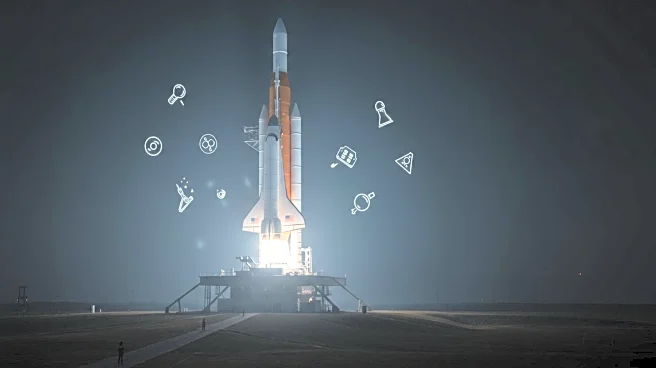What's Happening?
Blue Origin has postponed its 35th New Shepard mission, originally scheduled for August 23, 2025, due to an avionics issue with the booster. This mission, known as NS-35, was set to carry its 200th payload, including experiments and educational projects designed by students and researchers. The delay underscores the complexities involved in commercial spaceflight and the critical need for thorough testing and reliability in such missions. The NS-35 mission is particularly significant as it aims to advance scientific research by testing plant growth in microgravity and assessing environmental conditions. The mission also includes the launch of Club For the Future postcards to space, emphasizing the educational aspect of the mission.
Why It's Important?
The delay of the NS-35 mission highlights the challenges faced by commercial spaceflight companies in ensuring the safety and reliability of their systems. Successful payload delivery is crucial for ongoing research and development in space science, and any setbacks can have significant implications for future missions. The mission's focus on educational payloads underscores the importance of involving students and educators in space exploration, potentially inspiring the next generation of scientists and engineers. The ability to conduct experiments in space provides invaluable data that can lead to breakthroughs in various scientific fields, making the success of such missions vital for continued innovation.
What's Next?
Blue Origin will need to address the avionics issue before rescheduling the NS-35 mission. The company is likely to conduct further tests to ensure the reliability of the booster and other systems involved in the launch. Stakeholders, including educational institutions and researchers involved in the payloads, will be closely monitoring the situation. The delay may prompt discussions on improving safety protocols and testing procedures in commercial spaceflight. As Blue Origin works to resolve the issue, the broader space community will be watching to see how the company manages this setback and what measures are implemented to prevent similar issues in the future.
Beyond the Headlines
The delay of the NS-35 mission may have broader implications for the commercial space industry, particularly in terms of public perception and investor confidence. Ensuring the reliability of spaceflight systems is crucial for maintaining trust in commercial space ventures. Additionally, the involvement of educational payloads highlights the ethical responsibility of space companies to deliver on their promises, especially when it involves educational and scientific communities. The situation may lead to increased scrutiny of commercial spaceflight operations and could influence regulatory policies aimed at enhancing safety and reliability standards.









